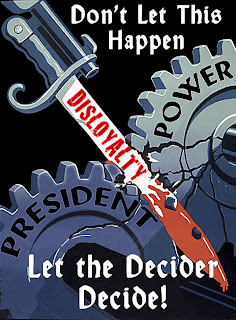Just how much personal power should a president have? In times of crisis or uncertainty, people seem to have a need to look up to a strong leader who will rescue them and lead them into a brighter future — thus the inclination to invest more and more power in a single office or person. This is a dangerous trend, though, because the fewer checks there are on power, the more easily that power can be abused.
In Guantanamo: The War on Human Rights, David Rose writes:
Past American presidents have tried to assume...exceptional powers in wartime, and all have eventually been overruled by the Supreme Court... In a 1967 case about rights to protest during the Vietnam War, Chief Justice Warren observed, “The concept of ‘national defense’ cannot be deemed an end in itself, justifying any exercise...of power designed to promote such a goal. Implicit in the term ‘national defense’ is the notion of defending those values and ideals which set this nation apart.”
In other words, any attempt to use the “national defense” as a justification of undermining the nation’s basic political liberties is, in effect, an attempt to undermine the nation itself. This means it contradicts the very principle of “national defense” as well. It must be remembered that in a democracy, ultimate power is supposed to rest in the hands of the people — insofar as a president has any power, it's merely on loan from the people.
An earlier ringing statement of principle was made by Justice Jackson, who had been America’s prosecutor at Nuremburg... Handing down his opinion in the 1952 case Youngstown Sheet and Tube Co. v. Sawyer, Jackson recalled the example of the constitution of the Weimar republic, which gave its president powers “to suspend any or all individual rights if public safety and order were seriously disturbed or endangered. This proved a temptation to every government, whatever its shade of opinion, and in 13 years suspension of rights was invoked on 250 occasions. Finally, Hitler persuaded President Von Hindenburg to suspend all such rights, and they were never restored.”
Such an usurpation must never be permitted in America, Justice Jackson said, even in time of war. “The claim of inherent and unrestricted presidential powers has long been a persuasive dialectical weapon in political controversy.” But “the essence of our free Government is ‘leave to live by no man’s leave, under the law’ — to be governed by those impersonal forces which we call law. Our Government is fashioned to fulfill this concept so far as humanly possible. With all its defects, delays, and inconveniences, men have discovered no technique for long preserving free government except that the Executive be under the law, and that the law be made by parliamentary deliberations.”
One of Germany’s most serious problems was the way in which a single officeholder, the Chancellor, could assume so much authority and power. A Chancellor could act without being accountable, without checks or balances, and without having to answer to anyone. Do Americans really wish to travel down a similar path by granting unprecedented and unaccountable power to their own president?
Sometimes it looks that way. People around the president are eager to assure him that he has the legal authority to do just about whatever comes into his mind — even if it includes ignoring international agreements, authorizing the torture of prisoners, and incarcerating American citizens without trial or access to counsel. The American president is being allowed to exercise near-totalitarian powers, but he’s doing it gradually and in small steps such that people don’t entirely realize it. They are even willing to approve of it, because the powers are being used against “enemies,” undesirables, and other disfavored groups.
Justice Jackson was right: a free society is one where people are subject to the rule of law, not the whims of a single man. Currently, though, President Bush and his closest advisors have been trying to defend the proposition that presidential decisions are independent of "parliamentary deliberations" and any votes cast by the Congress. Curiously, there has been little effort to defend it all openly and clearly — there seems to be an unwillingness on their part to say very specifically what they mean, what their theory of presidential power really is, and to defend it all before the American people.
Could this be because they recognize that too few people would agree with them if their plans were all laid bare? Are they consciously attempting to move America away from the principle of the rule of law in planned, gradual steps? America broke away from Britain in part because it no longer felt confident in the rule of a king and Americans refused to install a new king in George’s place; today, though, there is a indeed a new George in charge and we should not accept his arbitrary exercise of immoral, unlawful, and inappropriate power.


No comments:
Post a Comment
We'll try dumping haloscan and see how it works.